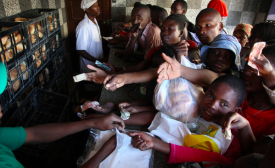public diplomacy
US Secretary of State John Kerry is reaching the last stretch of the first round (out of 12 at least) of the hopeless boxing match he is waging against the bitter fate in the Middle East. Kerry's paper will probably be called Terms of Reference, which is not easily translatable into Hebrew. Several alternative and loose translations are possible — such as "principles of reference," "an agreed-upon basis for discussion" or "negotiation guidelines" — and with them just as many variations.
It's a time-honored tradition: When a U.S. president gives his State of the Union address, interest groups pore over the carefully crafted remarks line by line, word by word, to assess the administration's priorities and blind spots. The exercise plays out, if to a lesser degree, overseas as well: The day after President Obama's sixth address, news outlets in Kiev, Beijing, and Tehran are picking apart references to their countries.
A State of the Union address is always a major public diplomacy moment. Rarely do you have the full attention of the entire world to tell every listener, watcher and tweeter, what exactly your current policy priorities are. For 2014, it is likely that President Obama will focus on domestic and international topics that are high up on America’s agenda and he is likely to stress that if Congress remains intransigent, he, the President, will have to use his Executive powers to make things happen in 2014 on the following issues.
All happy speeches are alike. All unhappy speeches are different in their own particular way. We connoisseurs of the diplomatic public speaking art are fortunate to have one example of a high-profile public speaking occasion where everything that could possibly go wrong did indeed go wrong. If you are working at an Embassy or in a Foreign Minister’s office and are looking for a model for how not do it, seek no further.
Iran is now our new favorite place to discuss at dinner. It is still one country. They seem to speak English there. Americans know we have a strained relationship with Iran from all those hostage movies, but we remain fascinated with all things Persian. America’s top destination remains Europe. It has countries we can visit — museums and hotels and attractions, such as the changing of the guard.

Non-governmental organizations, together with government institutions have been major stakeholders in Turkey’s African initiative. Humanitarian assistance, development aid, humanitarian diplomacy, and exchange diplomacy are central to Turkey’s existing involvement in Africa.

The Spring 2014 CPD-Journalism Forum examined the intersection of sports, journalism and international relations, as Russia plays host to the 2014 Sochi Winter Olympics (February 7-23).
Panelists:
- Derek Shearer, former ambassador to Finland; Stuart Chevalier Professor of Diplomacy and World Affairs, Occidental College
When one looks at official Canadian government policy towards Israel and Palestine, there doesn't seem to be much that is outstanding. Beyond the language on UN resolutions that provide Canada with room to protect Israel, the basic pillars are all there: Two-state solution, anti-settlements, reference to UN resolution 194 for refugees, etc. Yet, everyone knows that the Canadian prime minister's heart and soul, and his rhetoric, are firmly on one side: With Israel.







